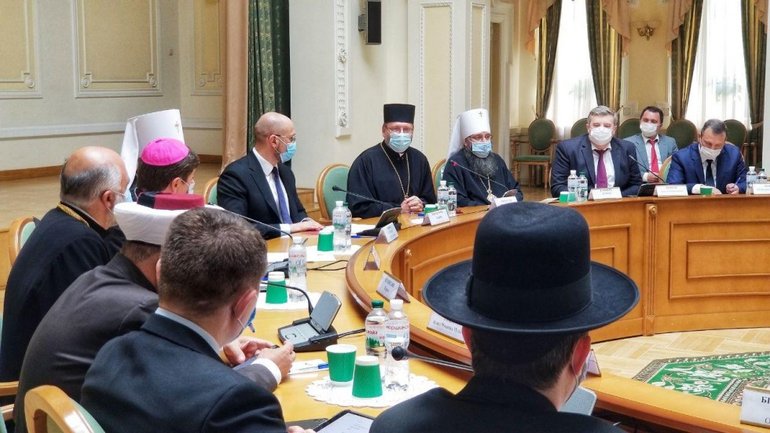
The heads of churches and religious
organizations are ready to help the government spread information among
the population about the necessary preventive actions to protect
themselves from infection with coronavirus, especially during the
educational process in schools.
This issue was
the subject of a working meeting of the All-Ukrainian Council of
Churches and Religious Organizations with the Prime Minister of Ukraine
Denis Shmygal and other members of the Government, which took place on
Thursday, August 20, In the club of the Cabinet of Ministers.
This was reported by the official website of the AUCCIRO.
The Head of Government noted that
current educational activities could help slow down the spread of
COVID-19 and avoid the risk of overloading the health system with
patients so that everyone can get the necessary medical care. In this
area, the government relies on the assistance of churches and religious
organizations.
Metropolitan Epifaniy,
Primate of the Orthodox Church of Ukraine, who chairs the AUCCIRO,
thanked the Prime Minister that the call of the religious community for
dialogue was heard and government meetings with the AUCCRIO are held
regularly.
He stressed the openness of the AUCCIRO
to cooperate with the Government in developing and implementing a set of
educational measures aimed at stopping the rapid spread of COVID-19 in
Ukraine. Metropolitan Epifaniy recalled the statement of the AUCCIRO, in
which religious figures called on the Ministry of Health to refrain
from generalized public accusations about the alleged General
non-compliance of the religious community with anti-epidemic measures,
and in return to eliminate possible risks through effective practical
interaction.
Head of the Ukrainian Greek Catholic Church, Patriarch Sviatoslav,
noted that the Church is experienced in forming a new culture of
behavior in society aimed at protecting the health and treating others
responsibly. According to him, in the context of the COVID-19 pandemic,
Ukrainian churches can become a driving force for the formation of a
safe culture of relationships between people – not only during services
but in everyday life, especially in the educational process.
This idea is also supported by Bishop Vitaly Kryvytsky,
who has stressed that it is not possible to replace school education
with online lessons fully, and therefore it is necessary to look for
optimal ways to restore the educational process in compliance with the
new culture of behavior in public places-use antiseptics and wash your
hands thoroughly, avoid physical contact and keep a distance.
Stanislav Nosov, Head
of the Seventh-day Adventist Church in Ukraine, has put forward several
proposals for organizing the educational process. In particular, he
suggests to place students in the class one person per desk, reduce the
duration of lessons with the possibility of introducing several changes.
In addition to this, the legal adviser to the Chief Rabbi of Kyiv and Ukraine, Hennady Bilorytsky
proposed to grant the right to educational institutions, including
schools, to independently determine the volume and level of necessary
quarantine measures, because the situation with the disease is better
understood on the ground. However, in his opinion, first of all, it is
essential to provide all schools with antiseptic means.
Also, the participants of the meeting
drew attention to the economic and social problems faced by many
families in Ukraine. First Deputy Senior Bishop of the Ukrainian Church
of Evangelical Christians Anatoly Kazachok suggested
paying attention to the issues of customs clearance of humanitarian
goods received by religious organizations. According to him, the
elimination of difficulties at customs will allow providing food and
basic necessities to many more people and families in need in difficult
life circumstances.
The meeting ended with the final
comments of the relevant officials, who announced the directions for
further practical cooperation of government structures with churches and
religious organizations.
